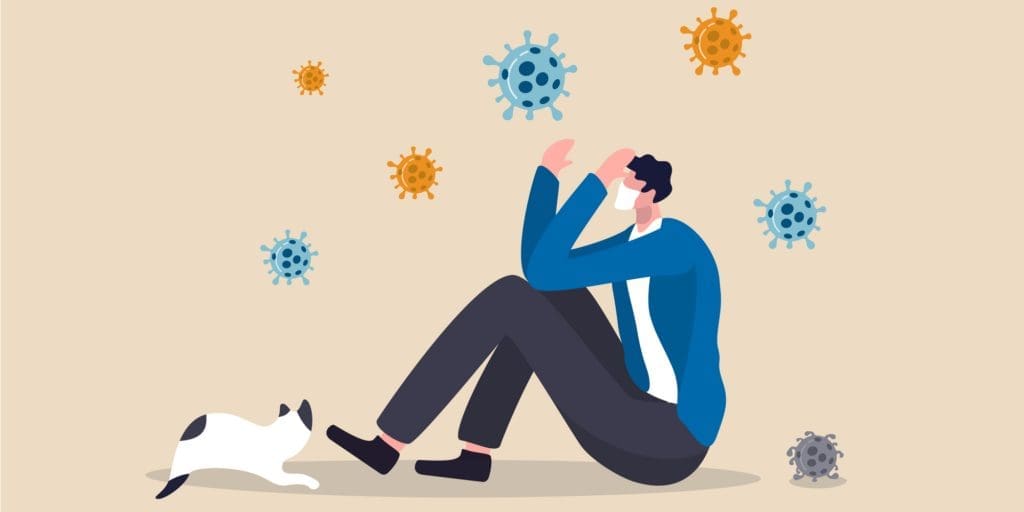Most people who catch COVID-19 will not become severely ill. Oftentimes, mild to moderate COVID-19 will subside in a matter of weeks, and people tend to recover relatively quickly. However, for some, the effects of COVID-19 have stretched far beyond normal infection and have caused lingering health problems that can wreak havoc for months on end. These unfortunate individuals have come to be known as COVID long-haulers. But what is long COVID, and what causes some people to become so sick? Below is everything you need to know about COVID-19 and its lasting effects.
What Is Long COVID?
Also known as post-COVID syndrome, long COVID is a symptom documented in people who experience lasting health effects following infection. In most cases, symptoms of long COVID are present even after the live coronavirus has left the body. This means if tested, a person with post-COVID syndrome would test negative for the virus, but could still be severely impacted by other health conditions.
It’s estimated that anywhere between 10% to 30% of people who have contracted the virus will experience some symptoms of long COVID. Some common symptoms are extreme tiredness or muscle and joint pain, with some cases reporting problems with memory and concentration.
Long COVID has several names. The National Institutes of Health has dubbed the phenomenon PASC, short for post-acute sequelae of SARS-CoV-2. More widely used names include post-COVID syndrome and long COVID, and people with the condition are known as COVID “long-haulers.”
What Causes Post-COVID Syndrome?

Currently, there is no clear understanding of what causes long COVID. Some scientists believe that one possible explanation for post-COVID syndrome could be due to the immune system. The theory is that some people’s immune systems will kick into a sort of ‘overdrive’ when it detects COVID-19. When this happens, scientists say the immune cells may begin to attack not just the virus, but the individual’s tissues as well. Experts believe this happens in people who may have very strong immune systems, or who experience stronger immune responses than others.
Another leading theory behind the root causes of long COVID is that the virus may remain in the body long after symptoms subside. Some experts believe the virus may leave “fragments” behind, that could lay dormant and then become active once again. This happens with other viruses such as the varicella-zoster virus, otherwise known as the chickenpox virus. While this theory sounds viable, there is still little evidence to support it, and further studies are needed to confirm its validity.
What we do know for sure, is that people who have certain risk factors, including high blood pressure, smoking, diabetes, obesity, and other conditions, are more likely to have a serious bout of COVID-19, and as a result, become a COVID long-hauler.
Long-Hauler COVID-19 Symptoms
Numerous symptoms have been reported by COVID long-haulers. The Centers for Disease Control and Prevention (CDC) classify long COVID as “ongoing health problems people can experience four or more weeks after first being infected with the virus that causes COVID-19.”
Some COVID long-haulers report a range of new symptoms that were previously not associated with the virus such as difficulty thinking or concentrating or mood changes. Post-COVID syndrome has been reported in people who have had mild to moderate COVID-19, to people with severe COVID-19 infections. Below are some of the most commonly reported symptoms of COVID long-haulers:
- Difficulty breathing or shortness of breath
- Extreme tiredness or fatigue
- Worsening of symptoms after physical activities
- Chest or stomach pain
- Headache
- Skin rash or sensitivity
- Joint or muscle pain
- Pins-and-needles feeling
- Diarrhea
- Fever
- Dizziness while standing
- Difficulty sleeping
- Changes in mood
- Change in smell or taste
- Changes in period cycles
- Heart palpitations
Treatments for COVID Long-Haulers


While there is currently no test or definitive treatment for post-COVID syndrome, there are still many things you can do to improve your condition. About half of people with long COVID have reported an improvement in their symptoms after being vaccinated. Scientists believe that the increased immune response brought about by the jab can help fight the remaining fragments left behind by COVID-19. Vaccines can also help protect against contracting COVID-19, which in turn can help prevent you from becoming a COVID long-hauler.
For most, treatment for long COVID begins by talking with your doctor. Doctors and therapists can help work with you to address your specific symptoms and find a treatment plan that works for you. Some COVID long-haulers have reported that certain breathing exercises, physical therapy, and over-the-counter medications have helped with their condition. However, you should always talk with your doctor before making any changes that may affect your health.
Are You or a Loved One a COVID Long-Hauler?
Tell us about your experience in the comments below.
What Topics Would You Like to See Us Explore Next?
Email us at info@painresource.com with your ideas.
Are You on Facebook?





Hi there . Am post covid suffer from fatigue. Diarrhea sometimes fever and joint pains.. I tested positive in June but now its August am still not well . Am worried cos am constantly sick and have not yet vaccinated since am constantly not well..
Hello,
Thank you so much for reaching out and sharing your story with us. We’re so sorry to hear that you are not feeling well. If you are suffering from any of the above-listed symptoms of long COVID, it’s important to speak with your doctor about what treatments are best suited for you. As mentioned in our study, many people who are COVID long-haulers have reported an improvement in their symptoms following vaccination. Vaccinations remain the best way at preventing yourself and your loved ones from serious infection and hospitalization related to COVID-19. For more information on COVID-19, vaccines, and the delta variant, utilize resources such as the Centers for Disease Control and Prevention, World Health Organization, and your primary health care provider.